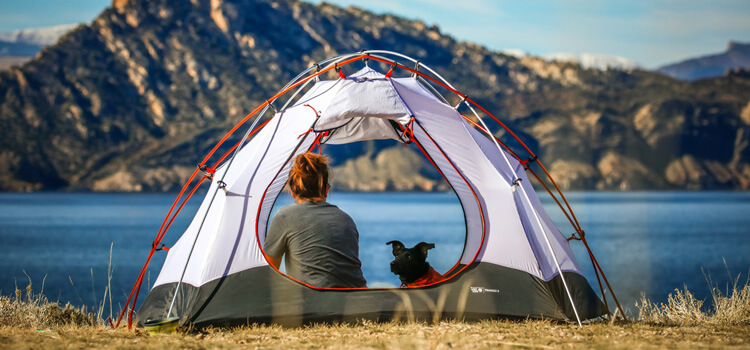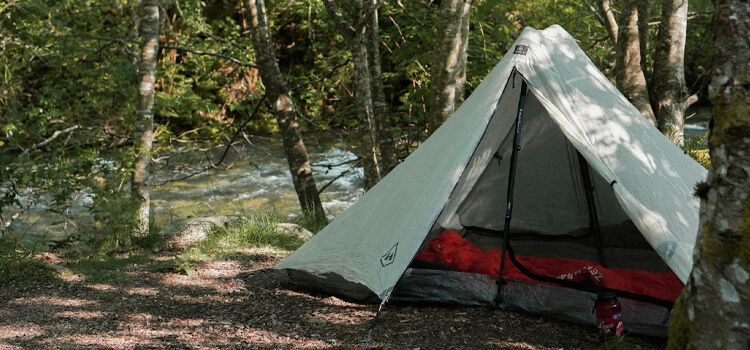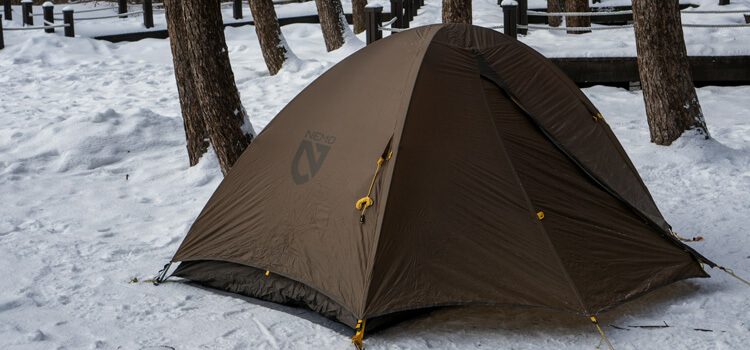As an Amazon Associate, I earn from qualifying purchases.

A backpacking tent should weigh less than 3 pounds. The lighter the pack, the better for you on a long trek. How light should a backpacking tent be? Picking the right backpacking tent for your outdoor trip is essential. A pack’s weight matters most when it comes to how luxurious your hike is. Ultralight tents typically weigh between 1 and 3 pounds and are intended for those who want to carry as little weight as possible. The ideal tent will have a combination of weight, sturdiness, and resistance to the elements.
As the demand or pressure for lighter packs grows, manufactures are integrating cutting-edge materials like Dyneema and silicon-coated nylon into the tents. An ultralight shelter can make a world of difference in your backpacking trip, rendering everything you put in the trails to be as easy as possible. Whether you are an expert or learner in the field of backpacking, it’s a wise move if you want to have an easier trip.
Importance Of Lightweight Backpacking Tents
The importance of lightweight backpacking tents is clear. Every step is more comfortable with a lighter tent. It allows every backpacker to hike their adventure without a millstone.
Enhancing Mobility On The Trail
It increases mobility on the trail. Every backpacker’s walking speed and distance can be thus sped up on long or passe trails.
- Fade away with faster setup and breakdown times;
- Less energy and resources are felt a really good challenge;
- More flexibility in the conditions of choosing camp sites;
Reducing Physical Strain On Hikers
The load can be evened out and the human posture straightforward with this tent Keeping the stamina up by keeping up the right weight to keep stableness and health.
Table
| Tent Weight | Physical Impact |
| Less than 2 lbs | Minimal strain, ideal for long distances |
| 2-4 lbs | Moderate strain, good for weekend trips |
| Over 4 lbs | Higher strain, better for short distances |
Factors Influencing Tent Weight
Backpackers often wonder about the ideal tent weight. Some very important factors that affect the weight of the backpacking tent are, and knowing them will help you find a tent that is light enough and strong enough to provide a sustainable place to stay.
Materials Used In Construction
The choice of materials is undoubtedly a crucial factor in the weight of a tent. Make sure that advanced fabrics and poles are used to achieve durability with a minimum weight.
- Nylon & Polyester: Durability with less weight;
- Cuben Fiber: Dyneema composite fabric, provides an ultra-light option but is very expensive;
- Aluminum: Lighter and similar strength in comparison with fiberglass poles;
Design Features Impacting Weight
Clever camping inspires tent designs that have led to significant weight reduction. A well-designed tent will be both lighter and will deliver the needed comfort using features camping would never forego. Find a tent with thoughtful design features to make your pack that much lighter.
| Feature | Impact on Weight |
| Single-wall construction | Reduces weight by eliminating the need for a separate fly |
| Minimalist pole design | Lowers weight; may use trekking poles for structure |
| Fewer zippers and pockets | Decreases weight; simplifies design |
Recommended Weight Range For Backpacking Tents
Choosing the right tent for backpacking is crucial. The ideal weight for your tent will define your level of comfort on your hike and, in the end, one’s endurance. A portable house that will be easy to carry and set up, ideally a combination of comfort, space, and strength is the correct weight balance. Below are the recommendations on the ideal weight range for a backpacking tent.
Ultralight Tents (1-2 Lbs)
These tents are every thru-hiker and minimalist’s dream. These tents use high-tech materials to reduce weight. They are best for solo trekkers or people who don’t mind sacrificing space for weight.
- Best for long trips when every lb. counts;
- A small frame, only what you need;
- Materials like nylon and dyneema allow for minuscule weights;
Lightweight Tents (2-4 Lbs)
Is the happy medium between comfort and portability. This tent is best for most backpacks who are overall looking for a reliable shelter without the extra bulk.
| Features | Benefits |
| Durable materials | Long-lasting use |
| More headroom | Added comfort |
| Weather-resistant designs | Protection in diverse conditions |

Balancing Weight And Durability
Choosing a backpacking tent, you should find the perfect balance in terms of lightness and strength. You will not be able to take a heavy tent on a long hike, but a flimsy one can break in rough weather. The perfect tent should protect you from all dangers without creating additional stress.
Understanding Denier And Ripstop Fabrics
It is important to consider them more closely. For example, Denier is an indicator of the thickness of tent fabric threads. Thus, high Denier indicators mean that the fabric is thick and heavy, but it has a protective function . However, figuring out the Ripstop that this will stop the tear, people can choose fabrics with smaller Denier that will be strong as well. Of course, low Denier is much lighter than high, so it is suitable for those who plan long trips.
Impact Of Tent Poles On Weight And Stability
Poles determine the weight and stability of the tent, and people should choose aluminum poles. It is light and strong enough, but there are also fiberglass poles that are cheaper and heavier but do not justify these values.
| Pole Type | Weight | Strength | Cost |
| Aluminum | Light | Strong | Higher |
| Fiberglass | Heavy | Less Strong | Lower |
Assessing Personal Preferences And Needs
Choosing a proper backpacking tent is a matter of personal preferences. You should consider the space, weight, and comfort levels. Everyone is different, and I will help you find what is best for you.
Backpacking Style, Solo vs. Group
When making a choice, consider the intensity of your trekking. Some walk alone, while others prefer to be in a group. Consequently, this factor correlates with the mentioned aspects.
- One-seater lightweight tents best fill in the soloist requirement;
- Hiking with a group allows the members to divide the camping weight amongst the entire party;
Remember that the fewer people are there, the more comfortable and lightweight it is. On the other hand, a group tent allows individuals to move more freely and store gear more comfortably.
Weather Conditions and Seasonal Tents
Your choice should depend on the climatic conditions. The seasons change, and choose a tent that would be most suitable and comforting.
| Season | Tent Features |
| Summer | Light fabric, lots of ventilation |
| Winter | Durable, insulated for warmth |
Check how suitable your intended purchase is for different seasons. It will likely weigh a few grams heavier. However, as for a traveler, the comfort and safety should be prioritized.
Budget Considerations For Lightweight Tents
Your choice of a backpacking tent should not only take into account the tent’s weight but how much it costs you. Lightweight tents remain inherently expensive, but the right model ensures that you are more comfortable on the trail without adding unnecessary weight. Here’s how you can make a solid investment into your outdoor gear.
Cost Vs. Weight Savings Analysis
Investing into a lightweight tent may stretch your wallet thin. The majority of weight-saving solutions involve additional spending on more advanced but lighter materials. Consider the weight saved with the tent and the dollars spent on that difference.
- Calculate the weight saved by switching from the standard to lightweight;
- Then, the cost it saves you per an ounce of weight. Is this “dollar per ounce” justified?
Value For Money In Lightweight Tent Selection
Finding value in a lightweight tent is not just about how much it costs you. You could pick tents that you cannot afford, but you would most likely end up with poorly manufactured or poorly designed mod. Look for the one that would offer you the best od weight versus price versus quality. You learned that:
| Feature | Importance | Typical Cost |
| Material | High | $$-$$$ |
| Design | Medium | $-$$ |
| Brand | Low-Medium | $-$$$ |

Techniques To Lighten Your Backpacking Load
Backpacking trips are all about packing light, as every ounce counts. There are incredible ways to mitigate the weight of an entire tent or hatch by smart packing techniques or light gear selection.
Ultralight Packing Strategies
Ultralight packing is not about not taking things with you. It’s about taking the lightest ones. Here’s how:
- Assess the necessity of everything you take. Do you absolutely need that item?
- Always choose the lightest option. From a tent to a toothbrush;
- If you can get rid of the excess features that add more weight, such as a few tent stakes or extra straps, do it;
- Use a visual scale to see how much an item weighs;
Multi-purpose Gear Selection
Selecting gear that serves more than one purpose reduces your load. Here are some choices:
| Item | Primary Use | Secondary Use |
| Trekking Poles | Support while hiking | Tent poles for shelter |
| Bandana | Sweat absorption | Emergency bandage or pot holder |
| Lightweight Pot | Cooking meals | Eating bowl |
Conclusion
Picking an ideal backpacking tent involves weighing and comfort. A tent that is light but strong is best. Your curvy back appreciates the walk. A tent that doesn’t slow you down is best. Every little step you take is another opportunity for an adventure.
Related Articles:
- How to Choose a Backpacking Tent
- Best Budget Backpacking Tents
- Best Lightweight Hiking Boots for Men
FAQs
A 4-pound tent is relatively lightweight for backpacking . It’s a good compromise between durable and comfortable. However, depending on your idea of the trip’s duration, other details should not be neglected.
Typically, an ultralight tent is 1 to 3 pounds. They are relatively extremely light ; at the same time, tents provide carbohydrates with the basic needs.
Ultralight backpacking is carrying under 10 based pack weight . The less equipment you have on your back, the better trail enjoyment.
As an Amazon Associate, I earn from qualifying purchases.
Leave a Reply